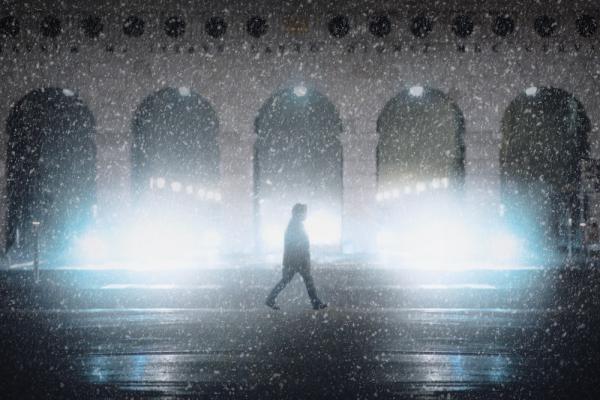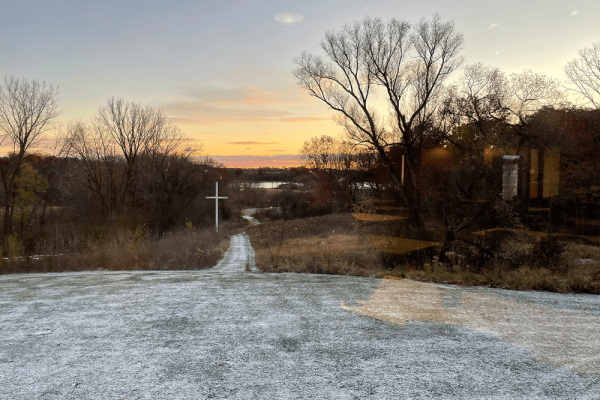I’m a latecomer to Lent. It wasn’t until I joined Sojourners in my first role as senior political director in 2004 that I learned from my Catholic colleagues the significance of this 40-day liturgical season in which we spiritually travel with Jesus through his fasting in the desert. In 2021, this time of reflection — so often marked by what we give up — comes amid what already feels like a dark, cold, and perilous winter.
Many of us are still giving up the ability to worship together in person. A virus that we prayed would be quickly vanquished has become a much more permanent fixture in our lives, causing so much loss and hardship. In the Bay Area and elsewhere, we've seen an alarming surge of xenophobic violence against Asian Americans in recent weeks that has left one person dead and many more injured. Since the onset of the COVID pandemic in the U.S. a year ago, the Asian Pacific Policy and Planning Council has documented nearly 3,000 incidents of anti-Asian hate across 47 states and the District of Columbia. In Texas and northern Mexico, millions have not had power for days as a result of unprecedented stress on the power grid due to severe cold that the region almost never experiences. Scientists have long warned us that climate change is responsible for more extreme weather events, and this storm is another sobering example.
It can feel overwhelming to find ourselves in the Lenten season for the second time since this pandemic hit, with many of us finding either much more or much less time for quiet, contemplative spiritual disciplines. Ash Wednesday, when we remember our own mortality, feels particularly timely, given the thousands of people dying from the pandemic every single day — a loss compounded by pandemic-related limitations on how we grieve and honor their lives. Even the ritual itself necessarily looks different this year, with congregations across the country adopting a variety of modified approaches, from silently sprinkling ashes on parishioners' hands to encouraging worshippers to pick up small boxes of ashes at the church to self-administer at home.
In light of these trying and extraordinary times, I asked a handful of colleagues and pastors to share their own reflections on how we can best enter into this Lenten season and what we can learn from a time typically marked by prayer, fasting, repentance, and self-examination.
Rev. Brandee Mimitzraiem, pastor of Mighty Quinn Chapel AME in Lincoln, Neb., shared this powerful reflection:
We have spent so much time fearing getting sick, fearing dying, fearing everything, and calling our attempts to stay healthy a “sacrifice,” that we cannot see how refusing to be Divine, refusing to hasten death, refusing to participate in making others die before God is ready for them, is not a sacrifice — it is part of what it means to be interconnected. All of the things that we give up to be human and to be human responsibly, are not the same things that we give up in order to recognize that we are not God and that we need God. The purpose of Lent is to give up stuff so that we recognize we are fully human in need of a savior, so that by the time we get to Easter we are not confused about why we need Jesus. Leaning into spiritual disciplines that help to draw [us] closer to God gives both the spiritual fortitude for this time and enables us to experience fuller versions of our humanity, that we are acknowledging the majesty of God at the same time, so that it is not one or the other.”
In reflecting on how to step into this season of Lent as we are already experiencing such grief, my colleague and Sojourners magazine editor Jim Rice put it well:
Lent is often understood as just a time to “give up something.” Of course, the deeper purpose has always been to take a step back from our day-to-day habits and entanglements, to atone for our sins (and in particular the ongoing, often unthinking, ways we interact with the people around us, our world, and with God). Lent gives us a chance to reflect deeply on the way our imperfect selves (the “flesh,” as Paul puts it) get in the way of our spiritual growth (hence the focus on mortification of the flesh – fasting, “giving up” physical pleasures, etc. – to focus on our spiritual lives).
In these times of COVID-19 – times that have involved so much “giving up,” so much suffering – many have talked about approaching Lent differently, emphasizing not giving up or self-sacrifice but something else (taking care of oneself, say). But the heart of Lent is unchanged. Yes, we can and should acknowledge – and grieve – for all the losses we’ve suffered. That’s very appropriate, and needed. But the true, profound core of Lenten disciplines is not about giving up at all – it’s about drawing closer to God (and closer to others, to a just world, to a better and more faithful walk of discipleship). So on the one hand, yes: We’ve (collectively and, for many, individually) gone through and are going through some very difficult times. In that context, our Lenten soul-searching may be and feel different than in past years. But our spiritual work is the same: Look at the things in our lives that separate us from a “closer walk with thee” and endeavor to follow ever-more-faithfully in Jesus’ footsteps.
The former national chaplain of my own beloved fraternity, Alpha Phi Alpha Fraternity Inc., and senior pastor of St. Joseph AME Church in Durham, N.C., Rev. Dr. Jonathan C. Augustine emphasized that Lent is a season to stretch our understanding and commitment to worship:
So many pastors have become production supervisors and video producers, with worship that is intentionally celebratory, as liturgists divert worshipers' attention from losses to instead celebrate God's goodness. This has been especially true during Black History Month. On this Ash Wednesday, however, we have the opportunity to introspectively appreciate that Jesus' unparalleled sacrifice (and suffering) were his path to the celebration of the Resurrection. As we all are already sacrificing so much, we should be encouraged by Jesus' example and be reminded of Lent's biggest lesson: both liturgy and life are cyclical. This season of sacrifice will not last forever.
Rev. Aaron Graham, pastor of the District Church in Washington, D.C., offered this prayer:
I hear the Lord saying “my grace is sufficient for you, for my power is made perfect in weakness.” This pandemic has made so many of us weak. I haven’t been able to be with my people gathered in one place in almost a year ... I can’t wait to regather. And yet going through this Lenten season ensures that we come face to face with our weakness so that we don’t miss the risen Christ. God says when I’m weak I’m actually strong. I am trusting and believing that we will come out of these difficult days stronger as a church and a nation. I’m trusting that faith will win out over fear.
Lent reminds us that we don’t have to fear or hide from our weaknesses and vulnerabilities. We can find our strength in and through them.
In the season of Lent, I continually come back to my favorite devotion by the great theologian and mystic Howard Thurman who wrote, “How good it is to center down! To sit quietly and see one’s self pass by! The streets of our minds seethe with endless traffic; Our spirits resound with clashings, with noisy silences, While something deep within hungers and thirsts for the still moment and the resting lull.”
By centering down in this season of Lent, we can see with a more sanctified imagination the baggage that is weighing us down and preventing us from being more fully human. We can see with new eyes all that is separating us from God’s gravitational grace and unconditional love. We can better gain the resilience that will be needed to get through what we pray will be the final months of this pandemic and tap into the courage we will need to reimagine and then co-create a radically more just nation and world. In these 40 days we can hold onto the promise that Christ can and will make “all things new” as we approach resurrection Sunday and celebrate Christ’s victory over sin, injustice, sickness, and even death itself.
Got something to say about what you're reading? We value your feedback!







